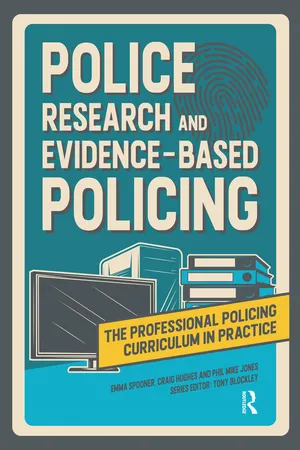
Police Research and Evidence-based Policing
- English
- ePUB (mobile friendly)
- Available on iOS & Android
Police Research and Evidence-based Policing
About this book
Evidence-based policing is a core part of the National Policing Curriculum but policing students and new officers often feel daunted by the prospect of understanding research and how to use it to inform decision making in practice. This text helps readers develop a sound understanding of evidence-based practice in policing and contextualises the research process by explaining how it supports practice within the workplace. It clearly relates research to the investigative process, combining academic theory and operational understanding using relevant case studies and scenarios, and identifies the main approaches employed. It explores how evidence from research can be used to inform and develop critical arguments central to policing practice and signposts students to key sources of information.
The Professional Policing Curriculum in Practice is a new series of books that match the requirements of the new pre-join policing qualifications. The texts reflect modern policing, are up-to-date and relevant, and grounded in practice. They reflect the challenges faced by new students, linking theory to real-life operational practice, while addressing critical thinking and other academic skills needed for degree-level study.
Frequently asked questions
- Essential is ideal for learners and professionals who enjoy exploring a wide range of subjects. Access the Essential Library with 800,000+ trusted titles and best-sellers across business, personal growth, and the humanities. Includes unlimited reading time and Standard Read Aloud voice.
- Complete: Perfect for advanced learners and researchers needing full, unrestricted access. Unlock 1.4M+ books across hundreds of subjects, including academic and specialized titles. The Complete Plan also includes advanced features like Premium Read Aloud and Research Assistant.
Please note we cannot support devices running on iOS 13 and Android 7 or earlier. Learn more about using the app.
Information
Table of contents
- Cover
- Title
- Copyright
- Contents
- About the series editor and authors
- Foreword by the series editor
- Acknowledgements
- Chapter 1: Evidence-based policing
- Chapter 2: Research as an investigation
- Chapter 3: Identifying existing evidence
- Chapter 4: Analysing existing evidence
- Chapter 5: Conducting your own research
- Chapter 6: Using evidence to develop practice
- Sample answers
- References
- Index